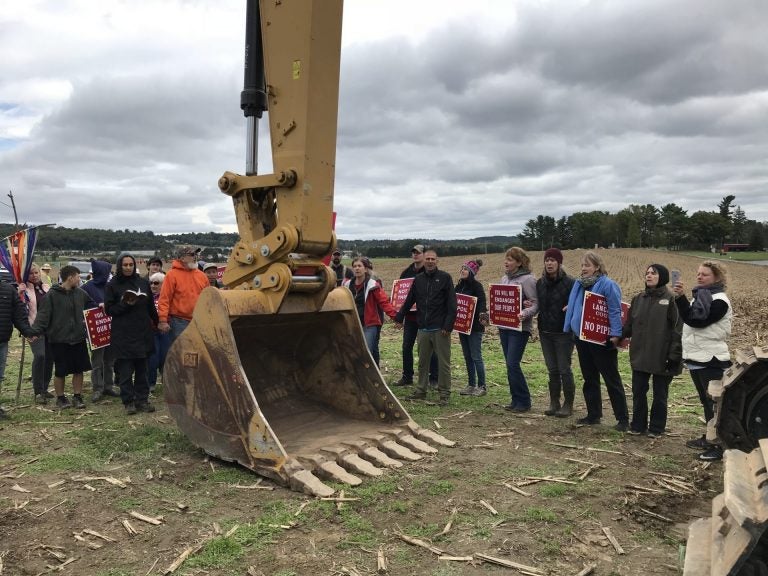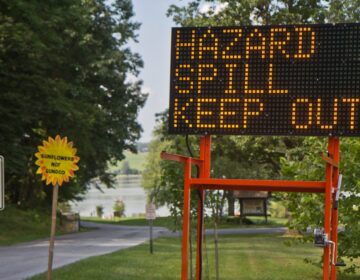Lawmakers consider tougher penalties for vandalizing pipelines, power plants
Pa. lawmakers are considering a bill establishing tougher penalties against people who vandalize “critical infrastructure.”

Protesters blocked pipeline construction equipment on the property of The Adorers of the Blood of Christ, an order of Catholic nuns, in Lancaster County last year. (Marie Cusick/StateImpact Pennsylvania)
As states grapple with how to respond to protests over pipelines and other infrastructure projects, Pennsylvania lawmakers are considering a bill that would establish tougher penalties against people who vandalize “critical infrastructure” facilities like pipelines and power plants.
Senate Bill 652 would make vandalism against those facilities its own crime, ranging from a second degree misdemeanor to a third degree felony depending on the amount of property damage. It would also establish felony charges for people who trespass with the intent to damage equipment or impede the operations of the facility.
A House committee advanced the measure earlier this week, amending a different version that passed the Senate earlier this year.
Rep. John Maher, R-Upper St. Clair, chairs the House Environmental Resources and Energy Committee, which approved the bill on a near-party-line vote with Republicans in favor.
He said the measure is necessary to adequately punish people who commit crimes that affect the greater community, like cutting a fiber optic line that provides Internet and phone service.
He said the new charges would fall between two extremes.
“Having a petty trespassing or terrorism charge as the only two options seems to be leaving our prosecutors a bit scratching their heads, and I just think it’s important that they have the tools they need,” he said.
The amendments adopted by the committee scrapped some language that critics feared would hinder protesters’ First Amendment rights.
Maher said the new version excludes charging protesters who simply enter a property with the tougher sanctions.
“Plenty of times, people enter without intent to do harm,” he said.
Rep. Mike Carroll of Avoca, the Democratic chair of the committee, said the amendments are an improvement, but he still has concerns.
“When you get to misdemeanors of the first degree and felonies, we should be very, very careful that we don’t impose such onerous penalties on folks,” he said. “It’s just patently unfair to open the door to a felony conviction or serious misdemeanors unless they’re warranted.”
Environmentalists and the American Civil Liberties Union have spoken out against the proposal.
Elizabeth Randol, legislative director of the ACLU of Pennsylvania, said people who damage such facilities can already be charged for several different types of vandalism, and this bill would allow prosecutors to pile on additional charges.
She also took issue with another part of the measure.
“Someone could be required to pay up to three times the amount of the damage that was actually done under restitution,” she said. “That is not allowed for any other victim of any other crime.”
The legislative and political director for the Sierra Club’s Pennsylvania chapter, Jen Quinn, pointed to what she considers problematic language that would charge a person who “defaces” or “inhibits the operations of” a critical infrastructure facility.
“Is hanging a sign defacement?” she asked. “Or, inhibiting or impeding the normal operations of a facility — what is the definition of that? Sitting and delaying something for a few minutes?”
The measure identifies 21 types of critical infrastructure facilities that would pertain to the proposed charges, including water intake structures, chemical manufacturing facilities and liquid natural gas terminals.
WHYY is your source for fact-based, in-depth journalism and information. As a nonprofit organization, we rely on financial support from readers like you. Please give today.




